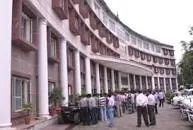Time to completely uproot terrorism from India: Shah

Sunday, 08 October 2023 | PNS | DEHRADUN
Union Home minister Amit Shah said that in the approach of counter terrorism, the time has come to completely uproot terrorism from the country by going beyond the zero tolerance policy and moving towards zero tolerance strategy and zero tolerance action. Changes in the society necessitate changes in the laws because the scale and method of crime has changed and now crimes are also being committed with the use of technology. Recently the Government of India has introduced three new criminal laws in the Parliament which are currently under consideration with the Standing Committee on Home Affairs. He said that these three new bills will replace IPC, CrPC and the Evidence Act, which were enacted by the British and in which no changes were made since 1860.
Speaking at the 49th All India Police Science Congress which began here on Saturday, he said that due to lack of changes in the old laws, there was a backlog of cases in the courts and the criminal justice system had become infamous for delays. After the passage of these three new criminal laws, the people of the country will get justice at the earliest. He said that by defining terrorism and organised crime in three new criminal laws, the Modi government has worked to protect the country. Strict provisions have been made in these laws for inter-state gangs, a lot of emphasis has been laid on capacity building of the office of the Directorate of Prosecution, to increase the use of forensic science, visits of forensic science experts have also been made compulsory in crimes having more than six years punishment. He said that action has been taken and a time bound plan has also been made to increase the conviction rate.
Shah said that the Indian criminal justice system is entering into a new era with the use of forensic science, role of CCTNS and ICJS and three new laws to replace IPC, CrPc and Evidence Act in Amrit Kaal. This will not only provide security to every citizen but also ensure internal security which is not possible without using technology. Under ICJS, computerisation of 99.9 per cent- 16,733 police stations of the country has been done and they are connected with CCTNS. Further, 22,000 courts have been connected with e-courts, data of more than two crore prisoners is available through e-prison, more than one crore prosecution data is available through e-prosecution and more than 17 lakh forensic data is also available through e-forensics. More than 90 lakh fingerprint records are available through NAFIS, data of all 22,000 cases registered under UAPA is also available over iMOT and through NIDAN, data of more than five lakh narco offenders in Narco is also available with the government. Apart from this, data of about one lakh human traffickers is also available under NDHTO, in cases of human trafficking. Data of more than 14 lakh alerts is available in CRIMAC, data of more than 28 lakh complete complaints is available in the National Crime Reporting Portal and the government is also going to do complete computerization of the prison. “We will have to strengthen our criminal justice system on the basis of such a vast database. We have made arrangements to present all types of documents before the court electronically, to make summons, warrants and testimony from prison online under the legal provisions in all these laws which will ensure justice without any delay. The implementation of all these provisions is possible only when the police of the entire country imbibe them and these are taken to the level of the police station. The Union government under Prime Minister Narendra Modi has also taken many steps for the security of digital public goods,” Shah said.
He further said that the country is progressing in every field and will emerge as a strong economic power in coming days and at such times the police and agencies will be required to protect the financial institutions more rigorously. He said, “When there is development in every field, many challenges also arise and our police will have to prepare themselves to meet those challenges. Our young police officers will also have to work on new issues like security of the country’s critical infrastructure, cyber security audit in states, social media and continuous monitoring of visas. There is a need to increase coordination between various agencies in the police forces of the states. There is a need to strengthen the system of Directorate of Prosecution, revival of the beat system, regularization of the parade and revival of the information gathering system. No one can analyse intelligence better than the human brain, for this we will also have to revive the information gathering system.”
Uttarakhand chief minister Pushkar Singh Dhami, director general of police Ashok Kumar and other senior officials were also present on the occasion.





